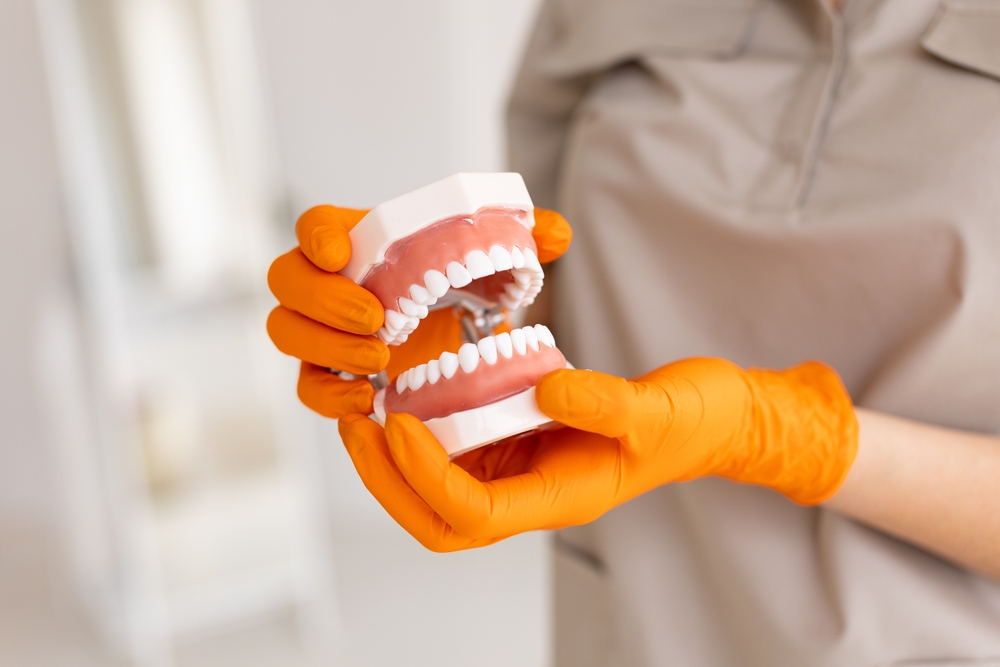
It can affect as much as your speech, including being confident in smiling. Thankfully, dentures provide a secure way of bringing back form and function. Whether you are doing it for the first time or helping a loved one through it, knowing the basics will make it smoother. If you are thinking of getting dentures, talking to an experienced dentist in Grande Prairie can provide you with the information you require to proceed.
What Are Dentures?
Dentures are removable appliances made to restore lost teeth and tissues. They are custom-fitted to your mouth and restore chewing, speaking, and appearance. Although they may require some short adjustment time, today’s dentures are more comfortable and natural than ever before.
Types of Dentures
There are several forms of dentures, each suited to different dental needs. Understanding the differences can help you and your dentist decide what’s best for your situation.
1. Complete Dentures
They are utilized when the top, bottom, or both jaws have all teeth missing. They are placed on top of the gums and are fabricated after any remaining teeth are removed and the tissues have healed.
2. Partial Dentures
They function best when some of your teeth remain. A partial denture replaces spaces for missing teeth and prevents other teeth from shifting.
3. Implant-Supported Dentures
They use dental implants for added support. They are usually suggested to patients who want a firmer fit and more chewing force.
4. Immediate Dentures
Placed on the day of tooth removal, immediate dentures enable you to go home with teeth in your mouth. They might need some adjustments in terms of fit while you recover.
Every type is advantageous and disadvantageous in light of such aspects as bone health, quantity of missing teeth, and way of life.
What to Expect When Getting Dentures
The process begins with a full dental examination and consultation. Your dentist will take impressions of your mouth to create dentures tailored to your anatomy. Once ready, your dentist will ensure they fit properly and comfortably. Over time, you may need minor adjustments to improve fit and prevent irritation.
Initial experiences often include:
- A slight lisp or change in speech (which improves with practice)
- Mild discomfort or pressure (as your mouth adjusts)
- Learning to chew and bite more effectively
Regular follow-ups with your dental provider are essential for long-term comfort and function.
Essential Denture Care Tips
To keep your dentures in good condition and ensure optimal oral health, follow these denture care suggestions:
- Clean Daily: Use a soft-bristled brush and denture cleanser (not regular toothpaste) to remove food, plaque, and stains.
- Soak Overnight: Most dentures need to stay moist to retain shape. Store them in a soaking solution or clean water overnight.
- Handle with Care: Avoid bending or dropping them. Always clean with a towel or a basin of water.
- Rinse After Eating: Remove and rinse dentures after meals to eliminate debris.
- Don’t Ignore Gum Health: Gently clean your gums, tongue, and palate daily to prevent infections or irritation.
- Schedule Regular Checkups: Visit your dentist regularly to examine your dentures and oral tissues.
Common Denture Concerns and Solutions
New wearers often have concerns about their dentures slipping or causing sore spots. These issues are common during the adjustment period and can be resolved with slight modifications. Adhesives can offer added security, but they shouldn’t be a substitute for proper fit. If discomfort persists, consult your dentist promptly to prevent complications.
When to Consider Replacements or Relines
Dentures typically last 5–10 years, but changes in the jawbone or wear and tear may require updates. Signs you may need a replacement or reline include:
- Frequent discomfort or shifting
- Difficulty chewing
- Visible cracks or discoloration
- Changes in facial shape or sagging appearance
Regular assessments help ensure continued comfort and function.
Comfort You Can Feel, Confidence You Can See – Bear Creek Dental!
Dentures can dramatically improve your quality of life by restoring your ability to eat, speak, and smile with confidence. Whether you need full, partial, or implant-supported dentures, understanding your options and maintaining proper care is key to long-term success. At Bear Creek Dental, we’re here to guide you through each step. Book your consultation today and take the first step toward a healthier, more confident smile.
